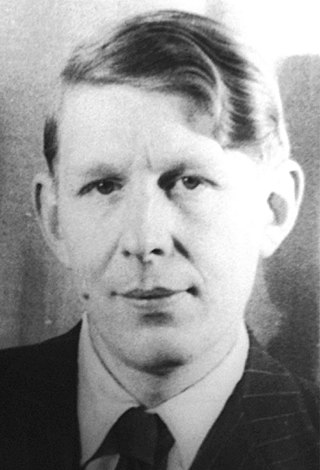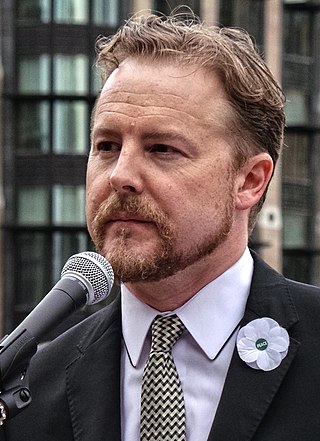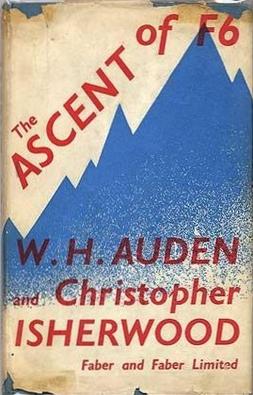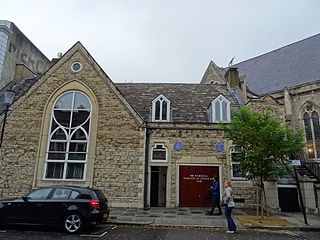Related Research Articles

Wystan Hugh Auden was a British–American poet. Auden's poetry was noted for its stylistic and technical achievement, its engagement with politics, morals, love, and religion, and its variety in tone, form, and content. Some of his best known poems are about love, such as "Funeral Blues"; on political and social themes, such as "September 1, 1939" and "The Shield of Achilles"; on cultural and psychological themes, such as The Age of Anxiety; and on religious themes such as "For the Time Being" and "Horae Canonicae".

Edward Benjamin Britten, Baron Britten was an English composer, conductor, and pianist. He was a central figure of 20th-century British music, with a range of works including opera, other vocal music, orchestral and chamber pieces. His best-known works include the opera Peter Grimes (1945), the War Requiem (1962) and the orchestral showpiece The Young Person's Guide to the Orchestra (1945).

Samuel Alexander Joseph West is an English actor, theatre director and narrator. He has directed on stage and radio, and worked as an actor in theatre, film, television, and radio. He has appeared as reciter with orchestras and performed at the Last Night of the Proms in 2002. He has narrated several documentary series, including five for the BBC about the Second World War.

Frederick Louis MacNeice was an Irish poet and playwright, and a member of the Auden Group, which also included W. H. Auden, Stephen Spender and Cecil Day-Lewis. MacNeice's body of work was widely appreciated by the public during his lifetime, due in part to his relaxed but socially and emotionally aware style. Never as overtly or simplistically political as some of his contemporaries, he expressed a humane opposition to totalitarianism as well as an acute awareness of his roots.

Hymn to St Cecilia, Op. 27 is a choral piece by Benjamin Britten (1913–1976), a setting of a poem by W. H. Auden written between 1940 and 1942. Auden's original title was "Three Songs for St. Cecilia's Day", and he later published the poem as "Anthem for St. Cecilia’s Day ".
"Funeral Blues", or "Stop all the clocks", is a poem by W. H. Auden which first appeared in the 1936 play The Ascent of F6. Auden substantially rewrote the poem several years later as a cabaret song for the singer Hedli Anderson. Both versions were set to music by the composer Benjamin Britten. The second version was first published in 1938 and was titled "Funeral Blues" in Auden's 1940 Another Time. The poem experienced renewed popularity after being read in the film Four Weddings and a Funeral (1994), which also led to increased attention on Auden's other work. It has since been cited as one of the most popular modern poems in the United Kingdom.

Night Mail is a 1936 British documentary film directed and produced by Harry Watt and Basil Wright, and produced by the General Post Office (GPO) Film Unit. The 24-minute film documents the nightly postal train operated by the London, Midland and Scottish Railway (LMS) from London to Scotland and the staff who operate it. Narrated by John Grierson and Stuart Legg, the film ends with a "verse commentary" written by W. H. Auden to a score composed by Benjamin Britten. The locomotive featured in the film is LMS Royal Scot Class 6115 Scots Guardsman.
Charles Robert Owen Medley CBE, RA,, also known as Robert Medley, was an English artist who painted in both abstract and figurative styles, and who also worked as theatre designer. He held several teaching positions in both London and Rome.
Rupert Doone was a British dancer, choreographer, theatre director, and teacher in London.

The Ascent of F6: A Tragedy in Two Acts, by W. H. Auden and Christopher Isherwood, was the second and most successful play in the Auden-Isherwood collaboration, first published in 1936. It was a major contribution to English poetic drama in the 1930s. It has been seen as a parable about will, leadership and the nature of power: matters of increasing concern in Europe as that decade progressed.

The Dance of Death is a one-act play in verse and prose by W. H. Auden, published in 1933.

On the Frontier: A Melodrama in Three Acts, by W. H. Auden and Christopher Isherwood, was the third and last play in the Auden-Isherwood collaboration, first published in 1938.
This is a bibliography of books, plays, films, and libretti written, edited, or translated by the Anglo-American poet W. H. Auden (1907–1973). See the main entry for a list of biographical and critical studies and external links.
The Habit of Art is a 2009 play by English playwright Alan Bennett, centred on a fictional meeting between W. H. Auden and Benjamin Britten while Britten is composing the opera Death in Venice. It premiered on 5 November 2009 at the Lyttelton Theatre at the Royal National Theatre, with the central roles filled by Alex Jennings as Britten and Richard Griffiths as Auden. The performance of April 22, 2010 was broadcast to more than 200 cinemas worldwide by NTLive.


Highfield was a large house situated at 128 Selly Park Road in the Selly Park area of Birmingham, England. Built in the 1860s, it was bought in 1929 by Philip Sargant Florence and his wife Lella Secor Florence after Sargant Florence was appointed as a professor at the nearby University of Birmingham.
Our Hunting Fathers, Op. 8, is an orchestral song-cycle by Benjamin Britten, first performed in 1936. Its text, assembled and partly written by W. H. Auden, with a pacifist slant, puzzled audiences at the premiere, and the work has never achieved the popularity of the composer's later orchestral song-cycles, Les Illuminations, the Serenade for Tenor, Horn and Strings and the Nocturne.
This is a summary of 1939 in music in the United Kingdom.

Peter Burra was a British writer and critic, the author of "The Novels of E. M. Forster".
References
- ↑ Sally Hunter (May 2005). "Shephard, Rupert Norman (1909-1992)". Oxford Dictionary of National Biography; OUP 2004; online edn. Retrieved 19 November 2013.
- Michael J. Sidnell (1984). Dances of Death: The Group Theatre of London in the Thirties . Faber.
- Robert Medley (1983). Drawn from the Life: A Memoir . Faber.